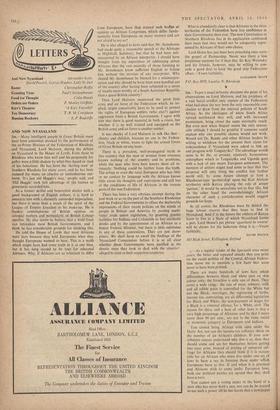And Now Nyasaland Alexander Scott,
David Poem Gervtis Hughes, Lady St. Just
Easter Christopher Hollis Granting Visas Paul Christophersen Food for Thought Colin Hands Orders are Orders P. Morley Griffiths Kiev's Theatres 'A Kiev Traveller' Toy Democracy T. R. M. Creighton Russian Rocketry E. P. Radcliffe
AND NOW NYASALAND
SIR,—Many intelligent people in Great Britain must have been somewhat shocked by the performance of the ex-Prime Minister of the Federation of Rhodesia and Nyasaland, Lord Malvern, during the debate on Nyasaland in the House of Lords. Even those in Rhodesia who know him well and his propensity for gaffes were a little shaken by what they heard or read of his behaviour. He has been the 'darling man' of Southern Rhodesia for many years, and he has been excused for many an abusive or cantankerous out- burst. 'It's just old Huggie's way,' people said, and 'Old Huggie' took full advantage of the licence so generously accorded him.
As a former skilful and benevolent doctor with a good background of English culture, it is hard to associate him with a distinctly outmoded imperialism, but there- is more than a touch of the spirit of the League of Empire Loyalists in his make-up. He is frankly contemptuous of British opinion on colonial matters, and particularly of British Labour opinion. He also seems to believe that a bold frorit can intimidate most British Governments, and I think he has considerable grounds for thinking this.
He told the House of Lords that most Africans were liars because they told Europeans what they thought Europeans wanted to hear. This is a myth which might have had some truth in it at one time, but it has .long ceased to be true, for educated Africans. Why, if Africans are so reluctant to differ from Europeans, have they created such bodies of opinion as African Congresses, which differ funda- mentally from Europeans on many matters and are not afraid to say so?
He is also alleged to have said that Mr. Stonehouse had made quite a reasonable speech to the Africans at Highfield, Salisbury, but that he had been mrs- interpreted by an African interpreter. I should have thought from my experience of addressing urban Africans that the vast majority of those listening to Mr. Stonehouse knew sufficient English to follow him without the services of any interpreter. Why should Mr. Stonehouse be blamed for a misinterpre- tation and why should he have been man-handled out of the country after having been subjected to a series of insults more worthy of a South American Republic than a quasi-British country?
Then Lord Malvern mentioned the good little army and air force of the Federation which, he im- plied, might conceivably have to be used to protect the rights of European settlers (who else?) against aggression from a British Government. I agree with him that there is good material in both services, but whether it is so well trained and equipped as the British army and air force is another matter.
It was cheeky of Lord Malvern to talk like that— cheeky and childish, because no one in the Federa- tion, black or white, wants to fight the armed forces of Great Britain on any issue.
There is a prevalent, well-propagated myth in this country that the man or woman from overseas, knows nothing of the country and its problems, while the man who lives here knows them all in- timately. Nothing could be further from the truth. The urban or even the rural European who has little or no contact by language with the African knows little about his thoughts and aspirations and still less of the conditions of life of Africans in the remote parts of the vast Federation.
There has been a very obvious attempt during the past week or so on the part of the Southern Rhodesian and the Federal Governments to efface the deplorable impressions of their recent policies on the minds of people in Britain and America by passing multi- racial trade union legislation, by granting greater facilities for Indians and Coloureds to buy 'alcoholic drinks and by the appointment of an African as a Junior Federal Minister, but there is little substance in any of these concessions. They are just show- pieces. We shall have to await the findings of the Nyasaland Commission before it is at all clear whether these Governments were justified in the drastic steps they took to deal with the situation, alleged to exist in their respective countries. What is abundantly clear is that Africans in the three territories of the Federation have less confidence in their Governments than ever. The new Constitution in Northern Rhodesia has in its application confirmed their fears that they would not be adequately repre- sented by Africans of their own choice.
Lord Home has just been here preaching once more the gospel of Partnership. Never was there a less propitious moment for it than this. Sir Roy Welensky and his friends, however, may be willing to con- cede a good deal to keep the good ship Federation afloat.—Yours faithfully,














































 Previous page
Previous page